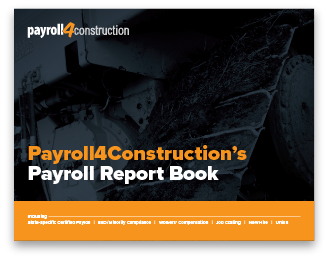Prevailing Wage Indiana: A Complete Guide for Contractors
Overview of Indiana's Prevailing Wage Landscape
Indiana repealed its state prevailing wage law in 2015, making it one of the few states without such state-level regulations. However, contractors working on federally funded projects in Indiana must still comply with federal Davis-Bacon Act requirements.
For any construction company impacted by federal prevailing wage laws, Payroll4Construction is here. As a complete payroll service, Payroll4Construction is built to keep contractors compliant with certified payroll reporting and Davis-Bacon prevailing wage rate determinations.
Keep reading to learn more about Indiana's prevailing wage landscape and how we can help you.
What is Prevailing Wage in Indiana?
While Indiana does not have state prevailing wage requirements, federally funded or federally assisted projects in Indiana must comply with the federal Davis-Bacon Act. This means:
- State and local government projects funded entirely by Indiana sources have no prevailing wage requirements
- Federal construction projects exceeding $2,000 must pay Davis-Bacon prevailing wages
- Projects receiving federal funding or assistance trigger Davis-Bacon compliance
The Davis-Bacon Act, passed in 1931, requires that workers on federally funded construction projects receive prevailing wages, ensuring contractors pay standardized wages that reflect local labor market conditions for similar work.
Don’t Let Prevailing Wage Compliance
Slow Down Your BusinessPrevailing Wage Rate Determination
Setting Initial Rates
The U.S. Department of Labor's Wage and Hour Division (WHD) has responsibility for establishing and maintaining Davis-Bacon prevailing wage rates that apply to federal projects in Indiana. These ensure fairness throughout the federal contracting process.
The WHD must:
- Determine appropriate prevailing wages, including hourly rates and benefit rates for each locality
- Publish these rates for use in federally funded projects
- Include these rates in all federal project specifications and contracts
- Update rates periodically to reflect current local conditions
Rate Calculation Method
The WHD follows federal regulations to determine fair and accurate compensation rates for Indiana localities. They establish rates by analyzing:
- Collective bargaining agreements in the specific geographic area
- Actual wages paid on similar construction projects in the locality
- Various sources of wage information for the relevant county or metropolitan area
- Input from public hearings and industry surveys when necessary
The Department of Labor uses Form WD-10 to collect wage determination data from contractors, unions and other stakeholders. This standardized form gathers information about wages, fringe benefits and working conditions across different construction classifications and geographic areas, ensuring accurate prevailing wage determinations.
Prevailing Wage Requirements
Davis-Bacon prevailing wage laws establish minimum compensation standards for workers on federally funded projects. These requirements ensure fair labor practices and create a level playing field for all contractors bidding on federal work in Indiana.
- Contractor

Contractors bear significant responsibility for ensuring project compliance with Davis-Bacon regulations. These requirements apply throughout the entire federal project lifecycle:
- Understanding which projects trigger Davis-Bacon requirements
- Obtaining current wage determinations from the Department of Labor
- Including accurate wage rates in project planning and bidding
- Ensuring all subcontractors understand Davis-Bacon obligations
- Paying Davis-Bacon prevailing wages to all covered workers
How to Submit Prevailing Wage Proof
Davis-Bacon Act compliance requires contractors and subcontractors to maintain detailed certified payroll records for all federally funded projects in Indiana.
This documentation process involves comprehensive record-keeping of worker information, ensuring transparency and accountability on federal projects.
Information needed for Davis-Bacon certified payroll includes:

- Worker name and address
- Social Security number
- Work classification
- Hourly rates of wages paid
- Daily and weekly hours worked
- Deductions made
- Actual wages paid
- Fringe benefits provided or cash equivalent
Contractors need certified payroll records and evidence of proper wage payments throughout federal projects. Davis-Bacon compliance requires contractors to certify that they:
- Pay prevailing wages as determined by the Department of Labor
- Maintain accurate payroll records
- Submit weekly certified payroll reports (WH-347 forms)
- Provide fringe benefits or cash equivalents as specified
- Comply with overtime provisions under the Contract Work Hours and Safety Standards Act
These records must be submitted weekly during the project and maintained for inspection throughout the project duration and for three years after completion.
Compliance, Enforcement and Consequences
The federal Davis-Bacon system relies on robust compliance mechanisms and meaningful penalties to ensure all parties adhere to established standards. These measures protect workers' rights, ensuring compliance with federal wage standards while maintaining the integrity of federally funded projects in Indiana.
Wage Payment Rules
Davis-Bacon laws establish minimum compensation requirements that cannot be circumvented. This ensures workers receive fair pay for their labor on federal projects.
The rules surrounding wage payment include:
- Workers must receive local prevailing rates for their job classification
- Rates include both basic hourly wages and fringe benefits
- Rates are based on Department of Labor wage determinations
- Employers cannot pay below these rates, even with worker consent
- Certified payroll records must be submitted weekly throughout the project
Violation Consequences
Significant operational and financial repercussions await contractors who fail to comply with Davis-Bacon requirements, potentially jeopardizing their entire business and eligibility for federal work.
Construction businesses are at risk of penalties, including:
- Investigation by the Department of Labor's Wage and Hour Division
- Debarment from federal contracts for up to three years
- Assessment of back wages owed to workers plus interest
- Civil monetary penalties
- Contract termination
- Potential criminal prosecution for willful violations
Prevailing Wage Whistleblower Protections
Federal law includes anti-retaliation provisions specifically designed to protect workers who report violations of Davis-Bacon requirements or certified payroll discrepancies.
Employees are protected from retaliation when reporting Davis-Bacon violations:
- Protection from termination
- Protection from disciplinary action
- Protection from discrimination
- Protection from threats
These protections apply specifically to matters involving Davis-Bacon compliance. They allow workers to safely report underpayment, misclassification, or certified payroll record falsification without fear of employer retaliation.
Penalties
The federal framework includes substantial financial penalties and establishes clear liability structures to encourage compliance with Davis-Bacon requirements.
Financial consequences include:
- Back wage payments to affected workers
- Liquidated damages equal to unpaid wages
- Civil monetary penalties for repeat violations
- Debarment from federal contracting
- Contract termination and potential prosecution for serious violations
How Payroll4Construction Helps You Stay Compliant
Payroll4Construction is a construction payroll service that specializes in helping contractors and construction companies navigate the complex wage regulations of the Davis-Bacon Act.
These time-saving services reduce administrative hours spent on complex federal wage calculations and paperwork. In turn, this gives the team peace of mind knowing that Davis-Bacon obligations are being handled correctly.
Prevailing Wage Exceptions
Most federally funded projects in Indiana must adhere to Davis-Bacon prevailing wage laws. However, certain exemptions exist under specific circumstances.
These exemptions don't release contractors from fair wage obligations. Instead, the exemptions allow projects to follow alternative regulatory frameworks that still maintain worker protections and compensation standards.
Projects may be exempt from Davis-Bacon prevailing wage requirements if they:
Fall below the monetary threshold:
- Under $2,000 for federal construction contracts
Qualify for specific statutory exemptions such as:
- Certain emergency work
- Projects explicitly exempted by federal law
- Certain types of material suppliers not performing construction work
- Maintenance work that doesn't constitute construction, alteration, or repair
Are state or local projects without federal funding:
- Public works projects that are funded entirely by the state or local governments do not require contractors to pay prevailing wages
- These projects follow Indiana's standard wage and hour laws
- Contractors must still comply with federal Fair Labor Standards Act minimum wage requirements
In all cases, contractors remain responsible for understanding which wage standards apply to their projects. When federal funding is involved, following Davis-Bacon standards ensures compliance with all applicable federal regulations.



